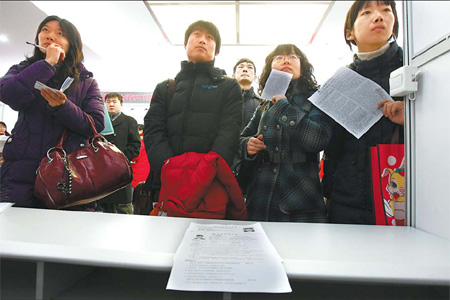Credit system to benefit students in job hunting
Universities to offer degree programs ranging from three to six years
Beijing's university students will be able to move at their own pace on the road to their degrees, taking between three and six years to graduate, if the city moves forward as expected with a more flexible credit system.
|
|
|
Job seekers line up at a job fair in Beijing. The city's universities plan to adopt a more flexible credit system to alleviate seasonal pressures on graduates.[China Daily] |
The Beijing municipal commission of education is mulling the overhaul in an attempt to ease unemployment pressures brought on by large numbers of students all graduating at the same time.
The idea would see universities and colleges in Beijing charge tuition according to credit hours of education received.
The plan may become operational as early as the fall semester, according to Beijing Daily, which cited sources from the commission.
Under the current system, students in Beijing pay tuition fees annually. It usually takes them four years to receive a bachelor's degree.
The city expects 220,000 students to receive degrees this year.
The anticipated overhaul of the system would mean students can move at different speeds and graduate at different times of the year, meaning they would not all be looking for work at the same time.
However, local faculty and students have expressed skepticism about the new system and some have said additional improvements are needed.
A teacher, surnamed Liu, from Beijing Institute of Technology, told METRO: "To better and fully implement this plan, I think we need to cross disciplinary boundaries, redesign the current curriculum and allow students to choose diverse courses more freely."
Xiong Bingqi, vice-president of 21 Century Education Research Center, said he hopes students' rights will be enhanced in future, along with the credit system.
He called for colleges to bring in more student autonomy and academic freedom and said the credit program should be developed by professors, with student input, and not by the universities' administration or functional departments.
Li Jin, a student from Beijing University of Posts and Telecommunications, told METRO: "We all have similar elective courses in our departments I hope we can have more chances to choose what we like and we don't need to pay more after this plan is implemented."
A student from the University of International Business and Economics, surnamed Wu, told METRO yesterday that students might try to take as many courses as quickly as possible in order to get their hands on their degrees sooner.
"If this plan is carried out, I think most students will choose easier courses, or take classes that are easier to pass," Wu said.
Currently, students in Beijing spend between 5,000 and 6,000 yuan a year in tuition fees.
If the new plan is adopted, tuition fees will be charged on an hourly basis and calculated based on the training costs and teaching costs of each university.
Meanwhile, according to Beijing Youth Daily, inter-college elective courses will be available for many students in Beijing along with this new plan.
 0
0 







